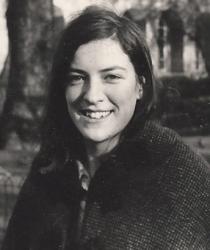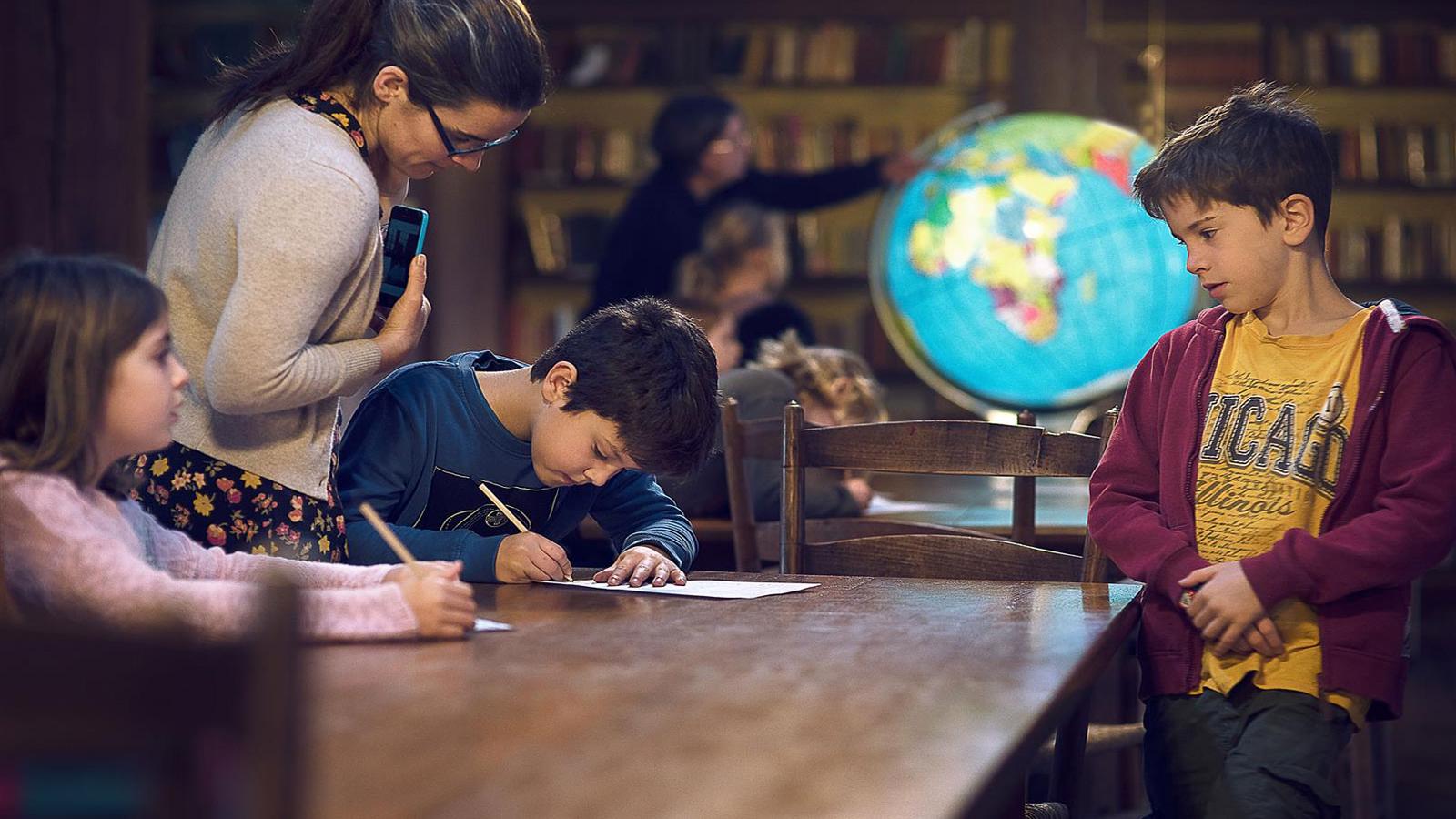
Historian, archaeologist writer and teacher, Judith Herrin has excelled in many fields on her way to general acceptance as one of the leading living authorities on the mighty Byzantine Empire. Here, she talks about the part that Bedales played in her academic and cultural development, as well as the importance of a background full of strong female role models…
Judith Herrin grew up as part of a tight, loving, and by her own recollection, “slightly odd” family unit. “Well, it was certainly unusual for the time,” Judith slightly amends her choice of word. “I never knew my father, who was killed during the war, and I was surrounded by a number of strong female figures but no men at all. My mother was a doctor, so there was also a housekeeper at home and always a big part of life was my formidable grandmother, who had had seven children in Victorian conditions and just revelled in her grandmotherly role.”
An intellectually able child from the start, Judith won a place at Oxford High School for Girls as an eight year-old. “That was more or less the equivalent of The Dragon School for Boys within the city,” she explains. “Academically, it was a stimulating place where I particularly enjoyed being introduced to Latin and French. The school was also sporty, although not excessively so, but as far as music and the rest of the arts went, it really wasn’t anything special. As I got older, I went rather boy-mad and my mother eventually decided that a mixed school environment might be best for me.”
“She took the business of choosing a new school for me extremely seriously,” Judith continues. “Before she ever looked at the mixed schools, we went round Sherborne, her old school, and considered Roedean, among others. Bedales, however, did have family significance. In the first place, we knew that my father had been there briefly – his name appears on the school war memorial – and we also had great friends in the Salamans who were devoted Bedalians and a big influence on the decision to send me to the school. I met Hector Jacks during my half day of entrance interviews and started rather nervously a year after most of my contemporaries.”
The library was Judith’s first refuge at Bedales. “I had turned up in a jersey and kilt, unsure of what was expected of me and conscious that I wasn’t in my regular clothes,” she says. “I knew no-one, of course, and I was rescued on that first day by the splendid Barbara Crump, by now very old and semi-retired, who told me that she needed a hand in the library, where I would in future years gain the most tremendous sense of literature and its importance. That helped me through my first evening nerves and I was placed in a very good dorm with some lovely friendly girls. Among them was a younger one called Fanny Peterson, who seemed far more homesick than I was, which gave me some sort of proper perspective on my own feelings at the time.”
Quickly enough, Judith was playing her part in a wide range of Bedales activities. “I was no great sportswoman, although I loved swimming and played in the mixed hockey team from time to time,” she reflects. “Outdoor work in particular was very much to my taste. We were taught so many useful skills – pruning roses is one that notably sticks in the mind. There was also the joy of play-reading with the great Rachel Cary Field. She had such a demonstrative, expressive way about her and you either loved it or you ran in the opposite direction! I loved it…..”
It was a school which combined friendliness, openness and the promise of new experiences
Of all the creative arts at Bedales, it was music that made the most lasting impact on Judith. “I enjoyed art without having much in the way of talent in that direction but one of my strongest early memories was of the whole school singing on a Saturday morning,” she says. “That was a major thing for me. I already played the piano but my real ambition had been to learn the bassoon; my mother had friends who played bassoon to a professional standard. When our director of music at Bedales needed a bassoonist, I immediately stuck my hand up and it became my passport to a different world of music at school, at university and beyond. I carried on playing and it was only a couple of years ago that I took my bassoon to the Benslow Music Instrument Loan Scheme, a wonderful organisation that loans good quality musical instruments to talented young players who might otherwise not have access to them. My mother’s viola is also at Benslow, which gives me enormous pleasure.”
In the classroom, it had long been obvious to Judith that her strengths lay in the arts and humanities, especially history. “I was no good at maths and not much better at the sciences, although I did enjoy our physics lessons,” she notes. “Two very different history teachers spring to mind when I think back to Bedales. Roy Wake was one – fluent and convincing, despite his attempts to imbue his students with his own deep reverence for Catholicism, which ran counter to the otherwise healthy agnosticism that I encountered and appreciated at the school. Despite everything, I found him to be an inspiring teacher who would always respond to a direct question with a direct answer.”
“I also very much admired John Slater, who was so persuasive in his enthusiasm,” Judith adds. “He had a great penchant for Italian history, taught us all a bit of Italian in between classes and even took us on a school trip to Italy, from which Arezzo and the Piero della Francesca frescoes remain a magical memory. Roy Wake would never have done anything like that but John was a great one for inspiring a love of travel and new experiences in general.”
Seventh term Oxbridge exams and interviews were followed by the offer of a place at Newnham College, Cambridge. Judith was more than ready for a new academic and social challenge. “I was already 19 by the time I had left, which I felt was too late, and I was keen to see what else was out there,” she says. “As it turned out, Cambridge was seventh heaven for female students, who were still in fairly short supply in the early 1960s.”
At Cambridge, it was the great Byzantine numismatist Philip Grierson who set Judith on the way to becoming acknowledged, in her turn, as one of the great contemporary authorities, teachers and writers on Byzantine history and culture. “Philip taught a course on The Expansion of Mediaeval Europe, which opened my eyes wide to a world that was the mid-point between East and West, one in which women played a leading role and one that immediately fascinated me,” Judith reflects. “I was told that I would have to learn ancient Greek if I was serious about studying Byzantium and that’s what lay behind my PhD at Birmingham University.”
This would be the precursor to Judith’s lengthy spell as an archaeologist in the 1970s and 1980s. Having trained in Paris, Athens and Munich, she worked with the British School at Athens and on the site of Kalenderhane Mosque in Istanbul as a Dumbarton Oaks fellow. “Archaeology is the best possible training for a historian, a teacher and a writer,” Judith believes. “It teaches you about the importance of sources and offers so much scope for fresh discovery. In my case, archaeology also allowed me to learn Modern Greek to go with the Ancient Greek that I had already studied and sent me out on digs that were of enormous practical relevance to my subject.”
From the start of the 1990s, Judith’s combination of practical and academic expertise was deployed to the benefit of new generations of Byzantine enthusiasts. Alongside numerous visiting fellowships, she most notably served as Stanley J. Seeger Professor in Byzantine History at Princeton University before her appointment as Professor of Late Antique and Byzantine Studies at King's College London in 1995, where she was also Director of the Centre for Hellenic Studies and, on her retirement, Professor Emeritus.
“As a teacher I was always determined to be hyper-friendly and outgoing because Byzantium can be quite a scary environment for students taking their first steps in it,” Judith observes. “My approach was to advertise the enthusiasm and pleasure that I have always derived from the subject and to show that it’s far from impossible.”
The research and writing that have always been a part of Judith’s life have continued unabated since she left King’s. Her standing in her chosen field was recognised by the award of the Heineken prize for History (the ‘Dutch Nobel prize’) in 2016. Meanwhile her historical books have gained an increasingly appreciative audience over the years.
“I always wanted to write something like Steven Runciman’s book on the Crusades – good, accessible history that would appeal to anyone with just a passing knowledge of the Byzantine world or none at all,” Judith says. “In that respect my first book failed because it was much too academic; writing accessible history is not that easy but I improved with time and practice.” Judith is too modest to mention that the improvement has been such that her latest book, Ravenna, Capital of Empire, Crucible of Europe (Penguin Random House/Princeton University Press, 2020) was awarded the Duff Cooper/Pol Roger Prize and shortlisted for the Wolfson History Prize.
I was also so fortunate to have spent many of my most important formative years at Bedales. It was an absolutely blissful time, where I met so many extraordinary people
The writing is set to continue for a while yet. “There’s always another book to write and I intend to go on for as long as possible,” Judith promises. “I’ve been very lucky to be able to do this and absolutely blessed with my inspiring life partner and two brilliant and wonderfully supportive children. I was also so fortunate to have spent many of my most important formative years at Bedales. It was an absolutely blissful time, where I met so many extraordinary people:
my first boyfriend Martino Tirimo, for example, the great Cypriot concert pianist, Steve Boyd and Frances Herdman, with whom I’m still in touch; and the much missed Robin Murray. Robin and Frances were head boy and head girl at the same time and later married; Robin’s brother, Sandy, a great historian; Michael Selzer, who was never afraid to criticize, and Roger Birnstingl, a very famous bassoon player – so many Bedalians went on to do such diverse, interesting things.”
"It was a school which combined friendliness, openness and the promise of new experiences and, very importantly, it was not just a place for white or English people,” Judith concludes. “Bearing in mind that I was at Bedales in the 1950s, the mixture of people that I met was truly remarkable (Indonesian, Hungarian, Pakistani and French). It didn’t matter where you came from – all sorts were not only allowed but always encouraged.”
Judith Herrin was interviewed by James Fairweather in Autumn 2022

